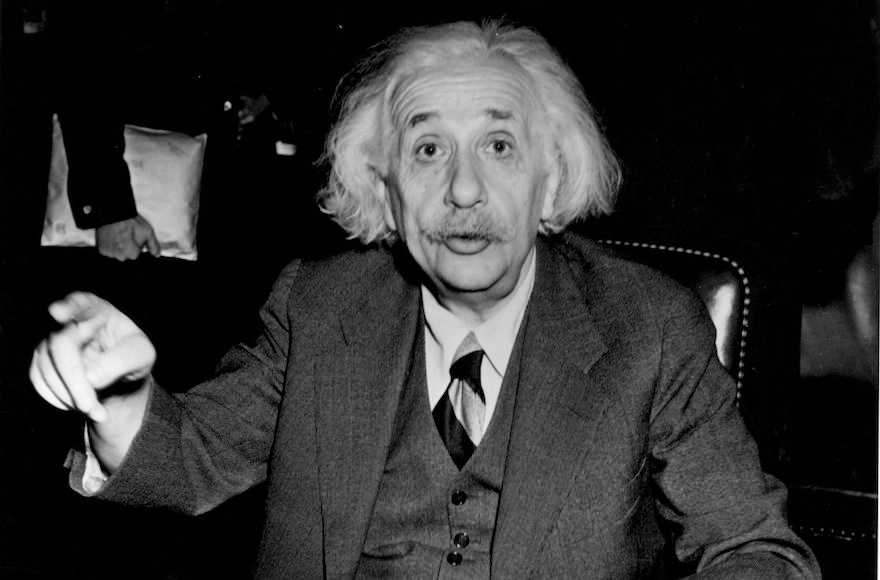In 1921, Albert Einstein presented a paper on his then-infant Theory of Relativity at the Sorbonne, the prestigious French university. “If I am proved correct,” he said, “the Germans will call me a German, the Swiss will call me a Swiss citizen, and the French will call me a great scientist. If relativity is proved wrong, the French will call me a Swiss, the Swiss will call me a German, and the Germans will call me a Jew.”
At the time, Einstein was not yet 40, but he had already spent most of his life forging revolutionary new ways of looking at the world.
An Interest in the Impossible
Albert Einstein was born in Ulm, Germany to assimilated Jewish parents in 1879. When Einstein was 10, his father’s business failed, and his family moved to Italy. Albert, who was already somewhat of a loner, became even more absorbed in his work.
In 1905, at the age of 26, Einstein had what he would later refer to as his annus mirabilis, or miracle year. While working as a patent clerk, he submitted four papers to a leading German physics journal, all of which were accepted for publication. One of them, “On the Electrodynamics of Moving Bodies,” argued against Newton’s ideas of an absolute space and time. It suggested that time and space are perceived differently by subjects in different states of motion. These papers contained the seeds of the formula that would one day be his trademark, appearing everywhere from T-shirts to hip-hop videos: E=mc2.

Help us keep Jewish knowledge accessible to millions of people around the world.
Your donation to My Jewish Learning fuels endless journeys of Jewish discovery. With your help, My Jewish Learning can continue to provide nonstop opportunities for learning, connection and growth.
Amazingly, Einstein continued working as a patent clerk for several years before finally receiving a professorship at the German University in Prague in 1911. It wasn’t until 1919, the year that a solar eclipse proved Einstein’s theory right, that he devoted himself to his research full time. It was also the year that he divorced his first wife, the mother of his children, and married his second wife, his cousin Elsa.
In 1920, Einstein received the Nobel Prize. Interestingly, it wasn’t awarded for the Theory of Relativity, but for his work on the photoelectric effect, which is a way of measuring the electrons that bounce off a surface when light shines on it.
The Bigger Things
Few if any scientists have captured the public imagination as profoundly as Albert Einstein. Part of Einstein’s appeal is his grandfatherly image and part is the genteel tone of his public writings as well as the ubiquity of his clever quotes. But it also might be the fact that he knew something about the inner workings of the universe, yet spoke openly about life’s mysteries — including God.
In 1927, a casual debate between Einstein and physicist Niels Bohr about determinism — the theory that everything that happens in the universe is determined by a prior chain of actions (and that, effectively, free will does not exist) — brought his religious opinions into the public sphere. While the debate centered more on quantum theory than the existence of a “higher power,” Einstein also articulated his belief that the universe possesses a fundamental order. His proof statement in the determinism arguments — “I, at any rate, am convinced that He [God] does not throw dice” — is often quoted in this context.
Still, Einstein vehemently shouted down people who attempted to read his ruminations on God into conventional religion. Yet he also said that conflicts between science and religion “have all sprung from fatal errors,” and that “science without religion is lame, religion without science is blind.” In 1930, Einstein wrote an article for the New York Times called “Religion and Science” that called for a more all-encompassing idea of God’s existence and argued that a fear or moral-based understanding of God ran contrary to modern science.
Einstein served as a board member of the First Humanist Society of New York. He was a supporter of ethical culture, but angered his fellow humanists with some of his ideas about God — a God, he said, who designs the universe with utmost precision and harmony, but not a God concerned with the fate of individuals. “A knowledge of the existence of something we cannot penetrate…which are only accessible to our reason in their most elementary forms — it is this knowledge and this emotion that constitute the truly religious attitude; in this sense, and in this alone, I am a deeply religious man.”
Physicist, Philosopher…President?
As a secular and scientifically inclined young man, Einstein renounced his Jewish identity. Later, while living in a Germany that was increasingly receptive to Nazi ideas, Einstein was motivated to take a stand against anti-Semitism and became a cultural Zionist. He had mixed feelings about the State of Israel but supported the idea of an institution dedicated to Jewish continuity and called himself a “strong devotee of the Zionist idea.”
In 1952, after the death of Einstein’s friend, then-president Chaim Weizmann, the Israeli newspaper Haaretz printed an editorial nominating Einstein as his successor. Eventually, Abba Eban contacted Einstein on behalf of Prime Minister David Ben Gurion. Addressing Einstein, Eban offered “complete facility and freedom to pursue your great scientific work would be afforded by a government and people who are fully conscious of the supreme significance of your labors,” though cautioning that “acceptance would entail moving to Israel and taking its citizenship.”
One Israeli government statistician was quoted in Time, saying, “He might even be able to work out the mathematics of our economy and make sense out of it.” Ultimately, Einstein declined, saying, “I am deeply moved by the offer from our State of Israel, and at once saddened and ashamed that I cannot accept it.”
Before his death, Einstein bequeathed his literary estate and all personal papers to the Hebrew University of Jerusalem. Despite his discomfort with the idea of a single “chosen people,” and his onetime renouncement of Jewish identity, Einstein believed that his work would find a stable, secure, and permanent home in Israel — the same hope that, perhaps, he had for his people.



